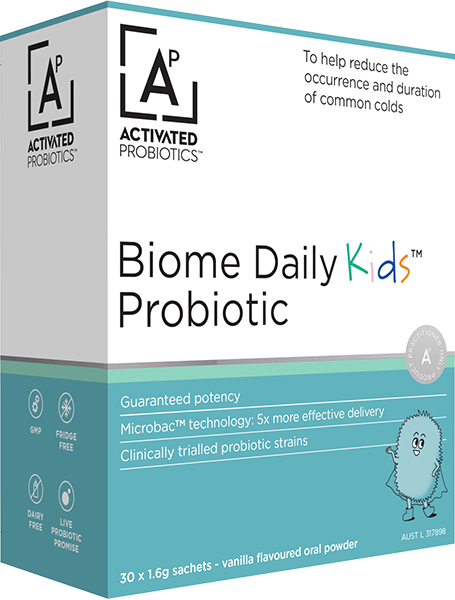
CHILDREN’S HEALTH
BY TANYA KWIEZ January 1, 2023
Research is now advocating probiotics as a low risk and efficient means of improving immune health in children and preventing day care associated infections.

‘Day care syndrome’, a phenomenon that many parents are acquainted with, refers to the revolving door of infections that frequently occurs in day care settings. The infections that are commonly associated with this ‘syndrome’ include gastroenteritis, leading to diarrhoea and vomiting, and upper respiratory tract infections such as common colds, ear infections and throat infections.
Experts suggest that the average child contracts between six to eight viral upper respiratory tract infections every year, with day care and hospitals being the two major settings where this is most likely to occur. When compared to children who remain at home, evidence indicates that children in day care acquire 2-3 times more infections and are prescribed more courses of antibiotics1.
However, it seems that some children contract fewer infections as they remain in day care longer, suggesting a more robust immune system is steadily developing. When comparing children of kindergarten age, those who have been in day care previously are less likely to be as sick as often simply due to earlier social exposure. It appears that if a child hasn’t contracted a particular infection in day care, they will go on to contract it during their first few years of schooling.
It’s clear that some infections are inevitable, and an important part of immune development. However, day care syndrome can be a troublesome and disruptive source of infection for the entire family. Children are often spreading germs and infecting others long before they develop any symptoms of infection themselves, leaving others unsuspecting and vulnerable.
Therefore, ensuring a child’s immune system is working optimally is essential for reducing the frequency and severity of infections and minimising the impact they have on their quality of life, education and their wider family’s health. Assisting children to make hand washing routine and to develop a robust immune system that can combat unnecessary infections is vital.
Evidence-based health interventions that can safely and effectively help in the prevention of excessive day care associated infections should be encouraged. Research is now advocating probiotics as a low risk and efficient means of improving immune health in children and preventing day care associated infections.
Specific probiotics have demonstrated the ability to assist the immune response in children. For example, Lactobacillus rhamnosus GG has been used successfully to prevent the occurrence of upper respiratory tract infections, such as colds and ear infections, in children attending day care3.
Likewise, it has also proven useful in the treatment of gastro as well as hospital-acquired diarrhoea2. Where antibiotics were necessary to treat infections in children, L. rhamnosus GG also demonstrated an ability to help prevent antibiotic-associated diarrhoea and protect their beneficial gut bacteria1.
It is important to know that not all probiotic strains have the same ability to boost our immunity, treat illness or prevent infection. When caring for your child’s immune health and working to prevent day care syndrome, it is essential to use specifically researched strains of probiotics with proven efficacy and safety profiles - such as L. rhamnosus GG.
1. Hojsak I. Probiotics in Children: What Is the Evidence?. Pediatr Gastroenterol Hepatol Nutr. 2017;20(3):139-146. doi:10.5223/pghn.2017.20.3.139
2. Hojsak I, Szajewska H, Canani RB, Guarino A, Indrio F, Kolacek S, et al. Probiotics for the prevention of nosocomial diarrhea in children. J Pediatr Gastroenterol Nutr. 2017 doi: 10.1097/MPG.0000000000001637.
3. Hatakka K, Savilahti E, Pönkä A, Meurman JH, Poussa T, Näse L, et al. Effect of long-term consumption of probiotic milk on infections in children attending day care centres: double blind, randomised trial. BMJ. 2001;322:1327.
To help enhance immune system function and reduce the occurrence and duration of common colds

